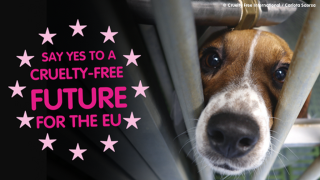
We still need your help to tell the EU to end animal testing
As a member of Cruelty Free Europe, we support their campaign to urge all candidates at the upcoming European Parliament elections to commit to three pledges to uphold plans to end animal testing in Europe.
The elections, across all 27 member states of the European Union, are being held from Thursday 6 – Sunday 9 June 2024. A total of 720 MEPs will be elected to the European Parliament, an increase of 15 from the current Parliament, to serve for the next five years.
Cruelty Free Europe are currently contacting sitting MEPs and will soon reach out to candidates in the election to emphasise the importance of this issue to European citizens.
The pledges are:
- Protect Cruelty-Free Cosmetics:
- Uphold the EU cosmetics testing ban, without exceptions.
- Promote the expansion of non-animal methods available for testing.
- End Animal Testing in the Regulatory System:
- Actively work towards the exclusive use of non-animal approaches in regulatory safety testing.
- Support the coordination of European agencies for the elimination of tests on animals.
- EU-Wide Action for Animal-Free Science:
- Endorse the phase-out of animal testing across all science and education in the EU.
- Prioritise funding for non-animal projects and promote education on non-animal approaches.
There were over 7.3 million uses of animals in laboratories in the 27 EU member states in 2020. Of these uses, 46% were considered by researchers to have caused moderate (2,627,477) or severe (733,456) suffering to the animals involved. Following the UK’s exit from the EU, most tests were carried out in Germany (1,897,640), France (1,643,787) and Spain (732,831).
Over 1.2 million people demanded the protection and strengthening of the EU ban on animal testing for cosmetics by signing the ‘Save Cruelty Free Cosmetics’ European Citizens’ Initiative, launched in August 2021 by a coalition of European animal protection groups including Cruelty Free Europe.
In response, the European Commission promised to start planning the total phase-out of animal testing for all chemicals.
However, a ruling in November 2023 by the General Court (the first level of the European Court of Justice), in an appeal by German cosmetics manufacturer Symrise AG, rendered the EU ban on animal testing for cosmetics virtually meaningless by adjudging that EU chemicals law, REACH, takes precedence over the cosmetics testing ban. As a result, SymriseAG have to conduct safety tests involving animals on two ingredients which have already been approved for exclusive use as sunscreens.
The toxicity testing for these sunscreen ingredients, as required by the European Chemicals Agency, will involve over 5,500 animals, including rats, rabbits and fish, being force-fed the ingredients in tests causing a high degree of suffering before being killed and dissected.
We were allowed to intervene in the appeals on behalf of SymriseAG.
Cruelty Free Europe’s Deputy Director of Science and Regulatory Affairs, Laura Rego Alvarez, said: “Europe stands at a crossroads in its approach to animal testing. The European Commission has agreed to plan the phase-out of the use of animals for testing chemicals yet animal testing continues to be demanded, including for ingredients used exclusively in cosmetics and despite those ingredients having already been shown to be safe for human use. We know that they can do so much better.”
“Animal testing touches the lives of the almost 750 million citizens in EU member states in many ways that most of us don’t appreciate, from cosmetics and household products to clothes, furniture, plastics, electronic and white goods, paints, dyes, garden fertilisers, and food. Many of these tests are outdated and ineffective, and have the potential to be replaced by cheaper, quicker and more reliable non-animal testing methods.”
Sign up for email alerts below so you can keep informed about other work we’re doing for animals in laboratories in Europe.
